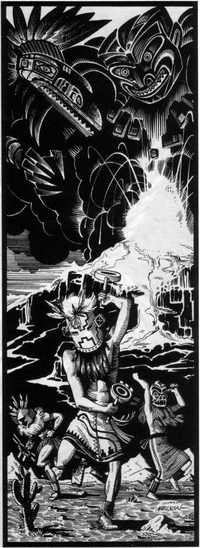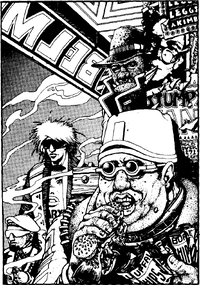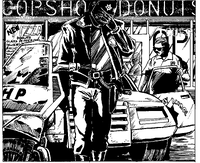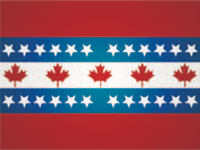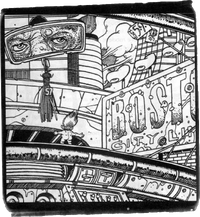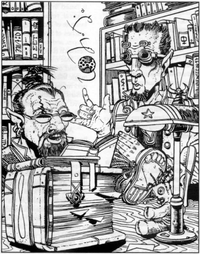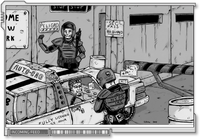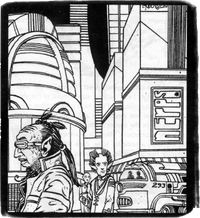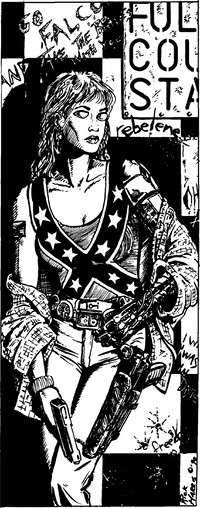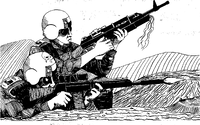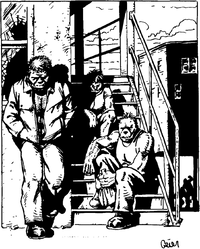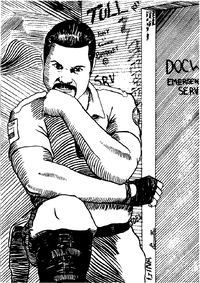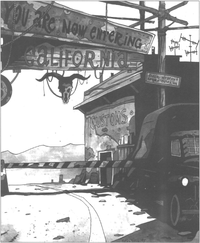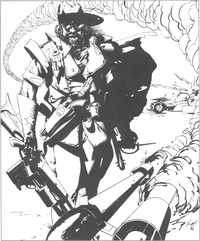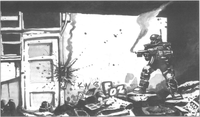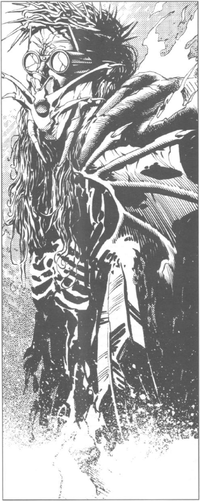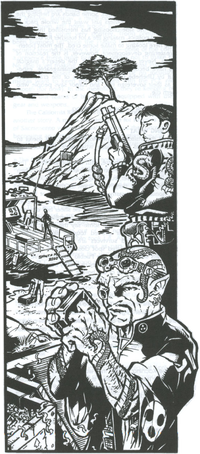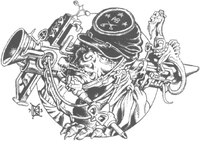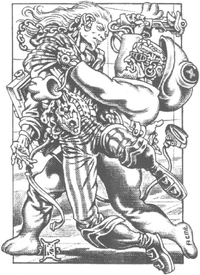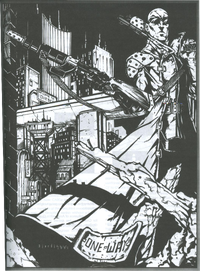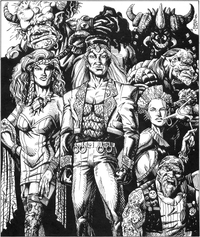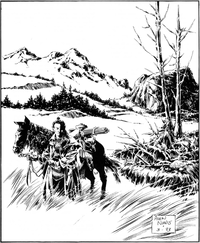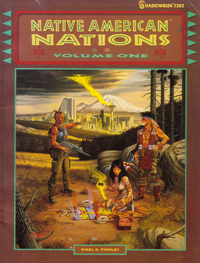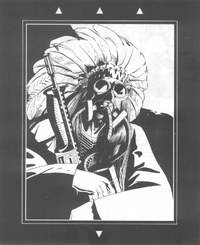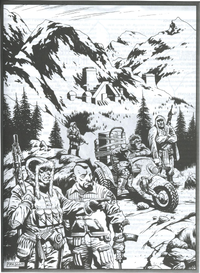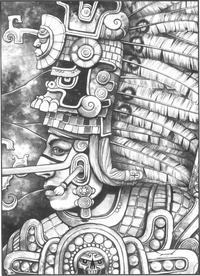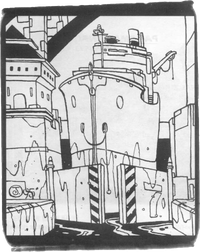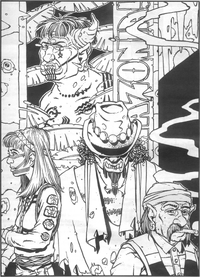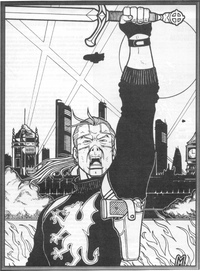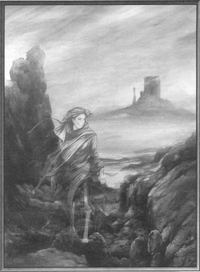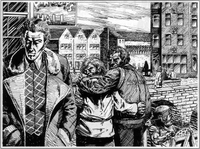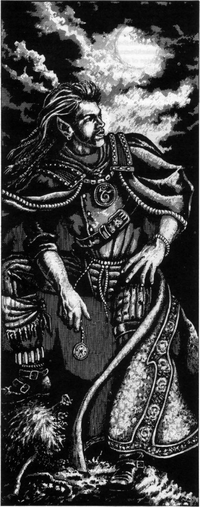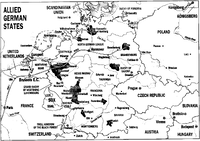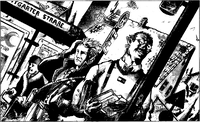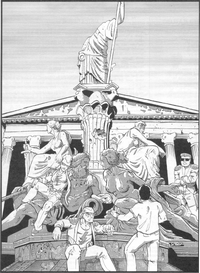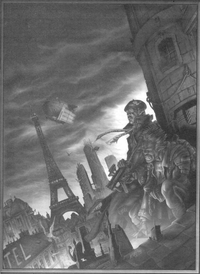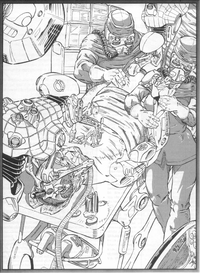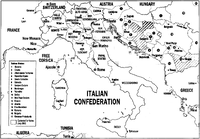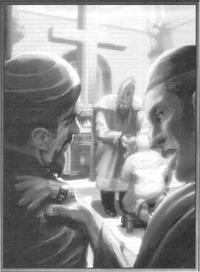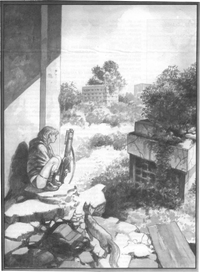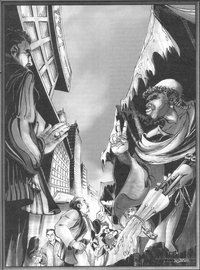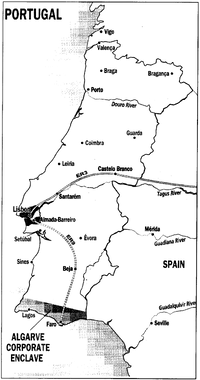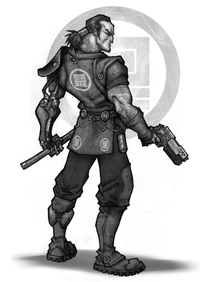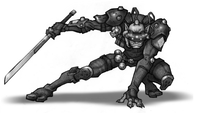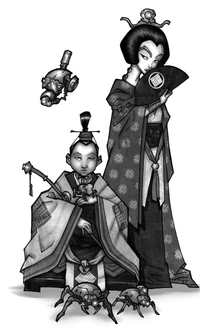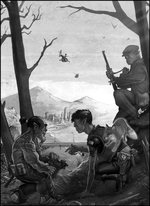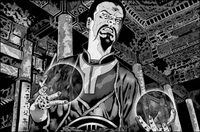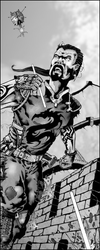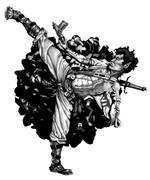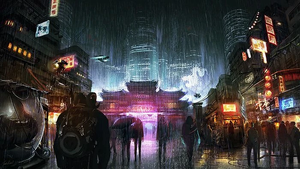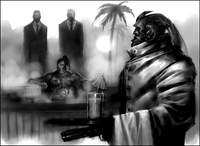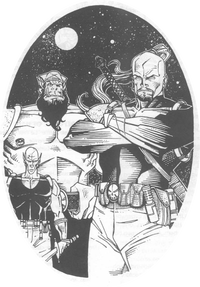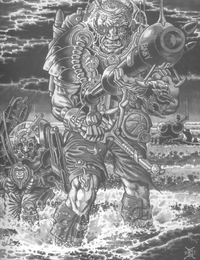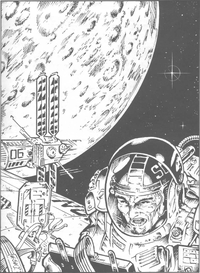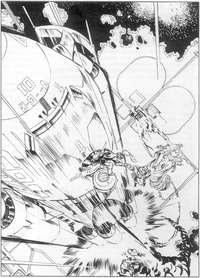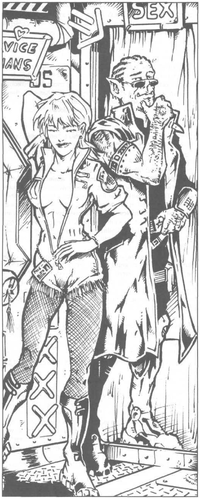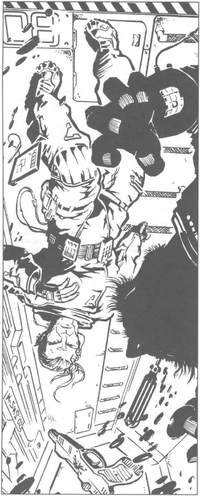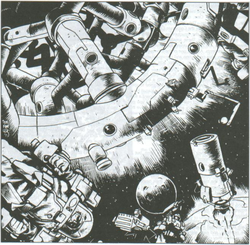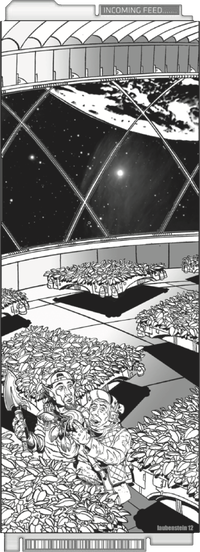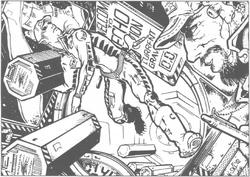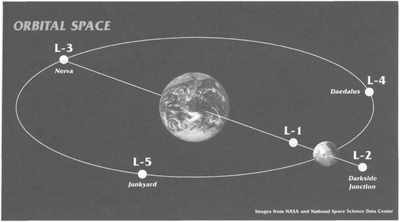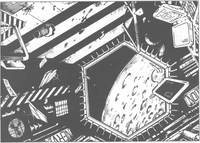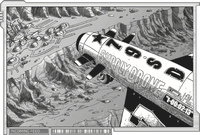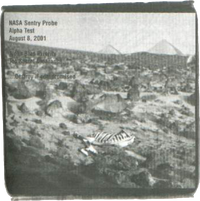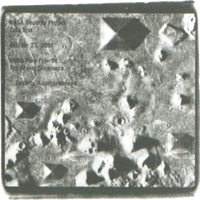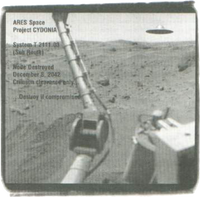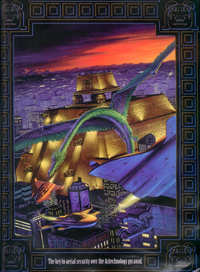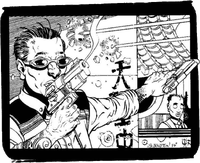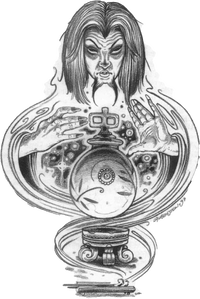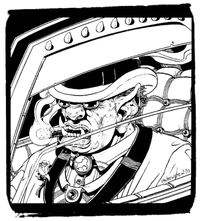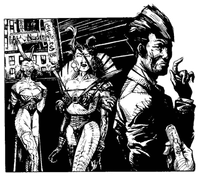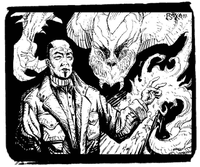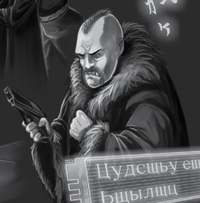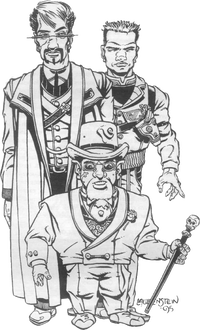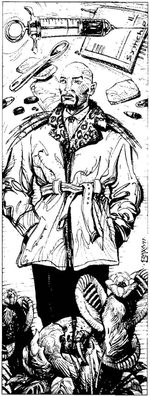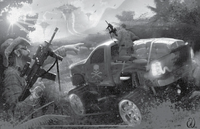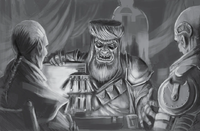Difference between revisions of "The World"
m (→Echo Station) |
m (→Echo Station) |
||
| Line 672: | Line 672: | ||
Since then, the station has grown to be a place where freelancers can congregate and find work without fear of corporate reprisal. A lot of smuggling to and from the moon and LaGrange points passes through ''Echo'' station and some of the residents act as fixers, hiring independent mercs for corporate Johnsons in space. The station management takes a small cut out of all the shadowy revenue to pay for supply and upkeep. | Since then, the station has grown to be a place where freelancers can congregate and find work without fear of corporate reprisal. A lot of smuggling to and from the moon and LaGrange points passes through ''Echo'' station and some of the residents act as fixers, hiring independent mercs for corporate Johnsons in space. The station management takes a small cut out of all the shadowy revenue to pay for supply and upkeep. | ||
<blockquote>''Echo management expects the resident criminals to cheat them a little, but anyone who tries to cheat them a lot quickly learns not to frag with the people who control the air supply. Other than getting their cut, and taking retribution on anyone who skrags essential station systems, central management tries to stay out of the factional politics that | <blockquote>''Echo management expects the resident criminals to cheat them a little, but anyone who tries to cheat them a lot quickly learns not to frag with the people who control the air supply. Other than getting their cut, and taking retribution on anyone who skrags essential station systems, central management tries to stay out of the factional politics that occur throughout the station.''<br>— Natasha</blockquote> | ||
Of all the corps in space, the only one with any presence on ''Echo'' station is Saeder-Krupp. The megacorp negotiated a deal with the station management to provide supplies and oxygen. Central management allows the Eurocorp to dock and refuel its shuttles heading out to the moon and Seader-Krupp attempts to keep to itself, leaving most inhabitants on ''Echo'' station satisfied with the arrangement. | Of all the corps in space, the only one with any presence on ''Echo'' station is Saeder-Krupp. The megacorp negotiated a deal with the station management to provide supplies and oxygen. Central management allows the Eurocorp to dock and refuel its shuttles heading out to the moon and Seader-Krupp attempts to keep to itself, leaving most inhabitants on ''Echo'' station satisfied with the arrangement. | ||
Revision as of 10:16, 20 May 2024
North America
Already reeling from the VITAS plague, the Awakening of magic, and the appearance of metahumans, North America splintered August 17, 2017 when—responding to the United States' escalation of its conflict with Sovereign American Indian Movement into a campaign of outright extinction—Howling Coyote initiated the Great Ghost Dance at Native American communities across the continent. Freak weather and uncanny disturbances assaulted the US military effort, with the havoc reaching its height with the eruption of Mount Hood, Mount Rainier, Mount St. Helens, and Mount Adams. Large portions of the United States and Canada were carved out to form the Native American Nations (NANs).
Already weakened, the United States and Canada were further destabilized with the Crash of '29, when an unprecedented virus swept the world's computer systems, crashing systems, wiping records, and destroying hardware. In need of a lifeline, they joined together into the United Canadian and American States in 2030. The alliance couldn't hold together, however, and the UCAS soon faced a rush of secessions.
United Canadian and American States
The United Canadian and American States, also referred to as the UCAS, CanAmerica, or America, is a federal republic in eastern North America, stretching from the Atlantic in the east to the beginning of the Rocky Mountains. It is the successor state to both the Dominion of Canada and the United States of America. It shares land borders with Quebec, Algonkian-Manitou, Sioux, Pueblo, and the CAS. The state of Seattle on the West Coast of North America is enclaved in the Salish-Shidhe territory.
The country consists of 33 states. These include twenty-seven former American states: Connecticut, Delaware, Illinois, Indiana, Iowa, Kansas, Kentucky, Maine (now incorporating formerly Canadian Newfoundland), Maryland, Massachusetts, Michigan, Minnesota, Nebraska, New Hampshire, New Jersey, New York, North Dakota, North Missouri, North Virginia, Ohio, Pennsylvania, Rhode Island, South Dakota, Vermont, West Virginia, and Wisconsin. They further include the five former Canadian provinces of Manitoba, New Brunswick, Nova Scotia (including Prince Edward Island), Ontario, and Saskatchewan. The capital, Washington, FDC, was expanded from the American capital of Washington, DC and is now recognized as a state of its own. The Seattle Special Administrative Region is similarly recognized as the state of Seattle. A UCAS citizen is formally known as a Canadian-American, with CanAmerican the acceptable diminutive, but the term American has retained significant global usage due to the dominance of the old USA in the new country and the term Canadian remains proudly claimed by residents of the former provinces.
Seattle
See the dedicated page for the Seattle Special Administrative Region.
Chicago
See the dedicated page for Chicago, including the Chicago Containment Zone (Bug City).
Northeastern Metroplex Axis
A megalopolis running along the northeastern coast of the UCAS, collectively referred to as NEMA. Heavily interconnected politically and economically, the region boasts the only high-speed train network in North America.
Boston
Boston is the capital and largest city in Massachusetts. Following the 2005 earthquake, it overcame New York City to become the business and cultural center of NEMA, with a diverse economy including global leadership in finance, education, health care, and technology. It is home to the Massachusetts Institute of Technology and Thaumaturgy (MIT&T), the East Coast Stock Exchange, and the headquarters of the Novatech AAA megacorporation and the Dunkelzahn Institute of Magical Research. In addition to its old moniker of Beantown, Boston is popularly known as The Hub.
The Five Boroughs
New York City was devastated by the great earthquake of 2005, with hundreds of thousands dead and hundreds of billions in property damage. While substantially rebuilt over the following decades, it has lost its perceived status as the capital of the world. The five boroughs were re-divided into individual cities while the East Coast Stock Exchange moved to Boston and the United Nations relocated to Geneva, Switzerland.
The crown jewel, Manhattan, was handed over to the megacorps, which jointly rule Manhattan Inc. via their seats on the Manhattan Development Consortium. After the earthquake, the corps rebuilt the island with a series of skyrakers and arcologies reaching high above the old skyline. The island features possibly the heaviest corporate security in the UCAS, restricted not only to SIN-carrying citizens but further by a series of color-coded pass-cards, issued by the municipal government dependent on status as a resident, commuting worker, visitor, government official, VIP, and so on. The pass-cards are frequently checked by various authorities and the penalties are swift and severe if an individual does not present and/or possess an acceptable pass-card.
While only Manhattan is formally under corporate control, their influence has spread throughout the rebuilding of the other four boroughs, now independent cities. The Bronx hosts the Villiers Arcology, commonly known as Co-op City, one of the largest condo megaplexes in the world. Brooklyn has seen the formation of the Coney Island Amusementplex, a massive megacorp expansion on the old amusement parks. Astoria in Queens features the largest simsense production center in the UCAS, the heart of the UCAS immersion industry since the secession of California and the quarantining of the Chicago Containment Zone. Of the old outer boroughs, Staten Island is the least changed, functioning as a relatively-affordable suburb of the other cities.
Philadelphia
Philadelphia has retained much of its original character from before the Awakening, adapting smoothly to the new world. The city sees investment by a number of AAA megacorporations, remains fiercly loyal to and critical of its many sports teams, and hosts the headquarters of the Humanis Policlub human supremacist organization.
Washington, FDC
Washington, FDC, officially the Federal District of Columbia and commonly known as DC, is the capital city and administrative district of the United Canadian and American States. It comprises the territory of the old American capital of Washington, DC plus the counties of Montgomery, Prince Georges, Howard, Arlington, Alexandria, and Fairfax, creating a state from much of the historically recognized National Capital Region.
Detroit
Detroit or the Greater Detroit Metropolitan Complex is located in the state of Michigan, in the UCAS. Site of the global headquarters for Ares Macrotechnology, parent company of Knight Errant Security Services, Detroit is prosperous and one of the safest cities in the UCAS. It is held up as a model of balanced civic and corporate governance, with a mere three percent unemployment rate according to the 2050 census.
Toronto
Toronto, Ontario is on the northern shore of Lake Ontario and part of the collection of metroplexes that make up the Lake Ontario Ring. (New York: Syracuse, Rochester, Buffalo/Niagara Falls, and Watertown; Ontario: St. Catherine, Niagara Falls, Hamilton, Toronto, and Peterborough). Toronto is one of the cleanest and safest cities in the UCAS and has a long-standing reputation for being a decent place to live.
The area saw some growth after the earthquake that hit New York City though some aftershocks from the quake were felt, but the damage was minimal. Some of the corporations left NYC looking for more stable ground and Toronto had an open for business sign. The Treaty of Denver saw a huge influx of Canadian expats to make it a boomtown and the Treaty of Richmond saw more investment when the corporations in the UCAS were worried about the political climate of the CAS.
Toronto is the entertainment capital of the UCAS. Having served as the ‘stunt double’ for other city locations, particularly New York, for years, when the UCAS lost California and Nashville, and most of its major film and television industry, New York and Toronto tried to take up the slack. Toronto proved the better venue for most entertainment corps, which bought up land and set up facilities here. Some are just subsidiaries of California Free State corporations, giving them a presence in the UCAS, while others are independent or belong to one of the megacorps. Vision-Quest, NBS, Mediaworks, Brilliant Genesis, and others maintain studios here.
Prince Edward Island
PEI drew the nation's attention for the first time in the 21st century when Dunkelzahn established his residence there, enabling his UCAS citizenship and eventual run for president. Following his death in 2057, his estate on the island was left in a trust dedicating it as a public park for use by the people of the UCAS. The site has drawn the devotion of many of his faithful, including such cults as the Children of the Dragon.
Confederation of American States
The Confederation of American States, abbreviated as the CAS, and sometimes referred to as the Confederated American States, is a republic in eastern North America, stretching from the Atlantic in the east to the beginning of the Sierra Madre. It shares land borders with UCAS, Pueblo, Aztlán, and South Florida.
The country has 13 states, which have a level of local autonomy according to the system of federalism. A CAS citizen is formally known as a Confederationist, but much of the world knows them as Confederates. While much of the country itself embraces the term, a minority of it, and many expatriates, consider it an insult, given its association to the moniker used in the American Civil War.
While marginalization of metahuman populations is common globally, the CAS has a reputation for the extremity of their subjugation, with the non-human portion of its prisoners being vastly higher than the already-common disproportion and prison labor being highly integrated into the national economy.
Atlanta
Atlanta is the capital of Georgia and the CAS in general. While the third largest metropolitan area in the CAS, behind Dallas/Fort Worth and Houston in Texas, it sees significant economic activity outside political administration. Major megacorporations headquartered in Atlanta include Hisato-Turner Broadcasting, Cord Mutual, DocWagon, Coca-Cola, Shaw Textiles, Global Business Computers, and the Atlantean Foundation. Many foreign corporations also install their CAS division HQ in Atlanta. The Georgia Institute of Technology (Georgia Tech) has achieved significant renown in the field of magical studies.
Dallas/Fort Worth
The Dallas/Fort Worth metroplex is the second most influential sprawl in the CAS, second only to Atlanta. The population of the city swelled tremendously following the invasion by Aztlán in 2035, mostly with Houston refugees, but also with a sizable number of Aztlán immigrants. The city was already on the edge of breakdown, but the influx of refugees pushed the services of the city to the breaking point. It is only within the past 15 or 20 years that DFW has managed to get a handle on its problems and emerge as a cultural and economic powerhouse in the CAS.
Socially, there are three dominant factors in DFW society:
- Firstly is the sizable Aztláner population, which forms upwards of 40% of the populace of the city. Confined to low-cost regions of the city, these de facto ghettoes have created a vibrant social scene in the city, which is becoming world renowned as the place to go for Mexican music and dance. It is part of their cultural identity that they are not Aztláner, but Mexican (or Latino), and calling someone an Aztláner is considered offensive and can be grounds for violence – at least for some.
- Then there are the associated tensions with the Aztlán government itself (or rather, Aztechnology). Anti-Aztláner paranoia is rampant, and is used to justify much discrimination against the Aztláners, and is the source of much violence within the Mexican/Latino community as well. The problem is complicated by an explicit policy of helping refugees flee Aztlán combined with a propensity for the Aztlán intelligence service to send agents disguised as refugees. There is a significant fear that Aztlán may be planning to start an insurgent campaign in DFW as a prelude to invasion – a fear stoked by the occasional terrorist bombing. Then again, the CAS and various refugee groups are trying to do the same thing to Aztlán.
- Lastly is the rather significant gap between the rich and poor within the sprawl, which manifests in a number of different ways. The small middle class is largely human, corporately affiliated, and rarely leave their gated enclaves. Lower class consists of a mix of Aztláner immigrants, poor Texans displaced by the Aztlán annexation, and a disproportionate number of metahumans (particularly orcs). The upper class consists of a mix of wealthy Aztláner aristocrats, upper crust CAS natives, and the social "glitterati" that dominate the DFW social scene.
California Free State
The California Free State is a libertarian republic on the west coast of North America. California borders the Pacific Ocean the length of the Sierra Nevada, featuring a diverse landscape and Mediterranean climate. The CFS comprises only a portion of the former state of California, with the territory from San Diego south claimed by Aztlán, Los Angeles having succeeded, and San Francisco—while still formally part of the CFS—being in practice controlled by a coalition of Japanese megacorporations.
Northern Crescent
The Northern Crescent, a mountainous region of California which borders Tír Tairngire, is home to the world's largest redwood old growth forest and has long been a target of the Tír elves. Much of this land was captured by them in the 2036 war, but guerrilla activity has kept the Tír from holding it safely. As such, the disputed territory is a constant see-saw battle of California Irregulars and Tir Paladins. The border is still porous and fluid, with lines changing from week to week.
The great dragon Hestaby makes her home on Mount Shasta in the Northern Crescent. She has mostly kept out of the border dispute.
San Francisco
San Francisco is a metroplex in the Bay Area of the California Free State, which has been under military occupation by the Japanese Imperial State since 2036 when it invaded the city to protect Japanese corporate interests during the breakup of the United States. Administered under military law, access to the city requires a SIN or other authorization acceptable to the Japanese Imperial Marines. All five Japanese megacorporations maintain a major presence in the city.
The larger Bay Area remains independent from Japanese control and has become a haven for metahumans expelled from the Japanese enclave. The People's University in Berkeley has produced a steady stream of notable shadowrunner deckers since its inception.
Big Sur
In the north the local water table has been rendered undrinkable by agribusiness, making the area a sparsely-populated toxic wasteland. Black and twisted plants, some of which move and hunt. In the south, towns and military bases abandoned during the breakup of the USA were taken over by gangs forced out of SF by the Japanese military.
There’s small farming communities dotted along the Salinas and Carmel rivers, these areas purified by powerful nature magic. The state governments unleashed the megacorp agribusinesses to take back the now-again productive land, but the same magic used to clean it was unleashed on them, leading to a long stalemate.
Massive aquaculture takes place off the coast growing genetically-engineered seafood in waters that have to be constantly protected from their toxic byproducts by powerful magic. The biggest of these is Kalamri Incorporated, whose aquasphere is a self-contained underwater city that can hold up to 15,000. The smallest notable one is Aqua Arcana, specializing in magical management of the local wildlife.
The southern portion of Big Sur is a pirate haven, the big three pirate kingdoms being O’Malley’s Empire, Monday of Morro Bay, and the Dread Pirate Paco. However, independent troops control a number of former military reservations.
Mojave
The Mojave covers a vast stretch of southeastern California. It's bordered by the Iny Forest on the north, Aztlán on the south, the Ute Nation on the east, and the Sierra Nevada mountains on the west. The California Rangers keep up with fixing potholes pretty well, but no one's resurfaced the roads in decades. Visitors are advised to use a hovercraft or something with four-wheel drive.
If you're a typical shadowrunner—somebody who eats, sleeps and breathes the sprawl—you'd best not come to the Mojave Desert without a fragging good reason. And if you do come here, read up on the place first. Aside from the few habitable towns scattered within it, the Mojave is an alien environment. It's a place of extremes, where relying on anything or anyone except yourself can kill you. At one end of the spectrum lies the corporate resort of Palm Springs, a monument to the power of corp money and technology. Here, richer-than-God execs and their friends cavort in air-conditioned splendor, insulated from the realities of everyday fiel by the best entertainment, food and assorted luxuries money can buy. Outside the fortified walls of Palm Springs lies the open desert, a harsh and unforgiving place. There aren't too many spots in it fit for (meta)humans to live, other than the military town of Barstow and a few scattered corporate military bases. There sure as drek isn't anyplace like the sprawl you're likely used to. No glass towers, no Stuffer Shacks, no climate-controlled shopping arcologies. The desert si its own world—a world of strange magical creatures, fierce nomadic bands, solitary shamans and powerful magical sites, where only the strong and cunning survive.
— Road Runner
Free City of Los Angeles
Enclosed on land by the California Free State, The Free City of Los Angeles sprawls across what used to be the Los Angeles, Riverside, and Orange counties, and additionally includes the western part of San Bernardino county. The free city is best known for its still-dominant position in the entertainment industry, ranging from film and TriD to simsense recordings and video games.
Moneyed Angelenos live in a select few scattered sanctuaries across the L.A. sprawl: Hollywood, Mulholland Drive, Westside, the UCLA campus and its immediate environs, and the corporate enclaves of Fun City and Studio City, each walled off from the sea of urban blight surrounding it by heavily-manned fortifications.
Studio City includes West Hollywood, Universal City and Beverly Hills, named for the many video, trideo and simsense studios there, plus all the necessary supporting industries. Those visitors allowed inside the walls will find such classic old-Hollywood tourist attractions as the Walk of Fame, Griffith Park, Universal Studios, Man's Chinese Theatre, and the Hollywood Wax Museum. Senior studio executives, major performers, and senior technicians and support personnel live inside the walls of the city itself, while the less important commute from nearby communities.
A collection of corporate interests, Fun City is a gigantic family-friendly amusement park that includes Virtual Disney, the Crystal Cathedral, Knott's Berry Farm, as well as a variety of newer additions. While it includes parks from a number of distinct corporate interests, management of Fun City is dominated by Amalgamated Studios, the largest player in the Los Angeles entertainment industry.
Republic of Québec
Québec, officially la République du Québec (English: Republic of Québec) is a country in eastern North America, between Hudson Bay and St-Laurent River, with its capital in Québec city. A socialist republic, it is traditionally an isolationist nation known for its fervently Francophone population and strict laws outlawing the use of other languages. Its economic face is the AAA megacorporation Cross Applied Technologies, though all AAA megacorporations maintain some presence in the republic. It shares land borders with the UCAS and the Algonkian-Manitou Council.
Tír Tairngire
Tír Tairngire (Gaelic for "Land of Promise") is one of the two Tír Nations (see Tír na nÓg), elven ethnostates established after the Awakening. Tír Tairngire comprises most of the former American state of Oregon as well as a portion of Nevada, while contesting territory in northern California.
Established initially as one of the Native American Nations, Tír Tairngire soon transitioned from a home for elven Native Americans to a refuge for elves from across the Americas, whether or not they possessed Native American lineage. It is ruled by the Council of Princes, an eleven-member body forming the high aristocracy of the state. The original members were appointed by Lugh Surehand, the founding High Prince, with replacements selected from the social and economic elite of the elven nation. The council includes one non-elven member, the great dragon Lofwyr.
Tír Tairngire did not sign the Business Recognition Accords. As such, megacorporations can only operate in Tír Tairngire through subsidiaries which do not enjoy extraterritoriality. Further, by law, the Council of Princes as a collective owns at least 5% of each such subsidiary and the head corporate officer must be a Tír subject, barring special dispensation by the Council.
Tír Tairngire security is provided by the Tir Tairngire Peace Force, a combined military and national police force. Its special forces are referred to as Paladins, which include the feared Ghost Circle, an initiatory circle of magically-adept warriors.
Native American Nations
The Native American Nations (NAN) is a union of Native American countries in North America. These include:
- Algonkian-Manitou Council
- Athabaskan Council
- Pueblo Corporate Council
- Salish-Shidhe Council
- Sioux Nation
- Ute Nation
- Trans-Polar Aleut Nation
- Tsimshian Nation
Denver
Denver was where the agreement establishing the North American Nations was signed. It and its surrounding territory form the Front Range Free Zone, a formally sovereign state governed by the Council of Denver, though highly subject to the whims of its controlling members. It is governed under the joint administration of these members, which comprise the five signatories of its creation (the UCAS, Aztlán, the Pueblo, the Sioux, and the Ute) and the CAS, which gained membership following its secession from the UCAS in 2034. Each of these parties controls a sector of the city, forming a series of wedges around the core Joint Administrative District, the CAS sector splintered from the territory of the UCAS.
Besides being a center for work in the Native American Nations, Denver is famous among shadowrunners for the Denver Nexus, the largest data haven in the world and home of the central node of the Shadowland BBS, the main hub of the North American online shadow community.
Salish-Shidhe Council
Among all of the NAN, the Salish-Shidhe Council is the most tribally-oriented, and their population and politics are segregated according to tribal affiliation. Each tribe sends representatives to the Tribal Council, and aside from a few nationwide civil laws and restrictions, each tribe is autonomous and self-governing.
The major tribes are:
- Salish – The most dominant and prosperous tribe. Tribal territory includes most of the land west and south of Puget Sound.
- Makah – The most military assets of all the tribes. Tribal territory is the northwest Olympic peninsula.
- Cascade Crow – Tribal territory is the land between Seattle and the Cascade mountains, as well as Vancouver. Strongly anti-Anglo.
- Sinsearach – Predominantly elven and eco-conscious. Tribal territory is the land southwest of Seattle, including Mt. Rainier.
- Cascade Ork – Predominantly ork and troll tribe with tribal territory in the Cascade Mountains.
- Nootka – Anti-technology traditionalists who have a presence in northwest Washington, Vancouver Island, and Prince George.
Other tribes include the Musqueam, the Squamish and several "pinkskin" tribes.
Among the megacorporations, only a few extraterritorial agreements have been reached with the SSC, simply because most tribes are not willing to part with the land. Most of the AAA megacorporations make do with offices in Seattle instead.
While technically part of the UCAS, the city/state of Seattle is surrounded by the SSC. The Council keeps a Seattle embassy on Council Island.
There's very little presence by the international criminal syndicates in the Salish-Shidhe Council. Local crime outfits are merely those from the Tsimshian Protectorate, especially the Dogmen.
Central America
Aztlán
One of the Native American Nations created in the wake of the Great Ghost Dance, Aztlán covers all of Central America, between Rio Bravo and Nueces River and the Andes, including the former territory of Mexico, Belize, Costa Rica, El Salvador, Guatemala, Honduras, Nicaragua, and Panama (excluding the Panama Canal Zone under the direct control of the Corporate Court). It also includes territory that used to belong to Venezuela and Columbia, as well as portions of the former US states of Texas, New Mexico, Arizona, and California.
The country of Aztlán is inextricable from Aztechnology. The AAA megacorporation dominates politics with its Azatlán party, intermingling its corporate governance with the national government, while also being the primary provider of security and military services to the state. The nation and corporation are notorious for their use of blood magic.
Panama Canal Zone
When the country of Panama joined Aztlán in 2048, the Corporate Court wrested control of the Panama Canal Zone from the expansionist state as part of Operation RECIPROCITY, launched by the other members of the Court to check Aztechnology's flouting of corporate law. The Panama Canal Zone grants control of the canal and its surrounding environs to the Corporate Court directly.
Administered by an appointed governor, the Panama Canal Zone has no army or security force of its own. Instead, the Corporate Court provides troops to defend it as needed, sourced from its constituent members. Those aboard a ship traversing the canal will find along the shores a mix of uniforms, from the red-and-navy of Renraku and the pale blue of Mitsuhama to the grays of Fuchi and the jade green of Yamatetsu. The dusty ochre of Aztechnology is missing, however, as the Corporate Court declines to include their forces among those used to control the Pan-Corporate Zone.
South America
Amazonia
Amazonia (port. Amazônia) is a major country located in the northeast of South America, comprising the territory of the former nation of Brazil as well as significant territory that used to belong to Venezuela (the remainder claimed by Aztlán or forming a small rump state enclaved within Amazonia) and the portion of Colombia not claimed by Aztlán.
Amazonia was formed in 2034 when revolutionary forces, led by the great dragons Hualpa, Sirrurg, and Arleesh, took the capital of Brazil. The feathered dragon Hualpa has served as Prime Minister of the state ever since, his Amazonian party forming a majority every election either independently or in coalition with one or more minority parties. The state has overseen comprehensive environmental reclamation, with the Amazonian jungle in particular seeing strong regrowth. The largest urban area, called the Metropole or "Rio Paulo" unites the cities of São Paulo and Rio de Janeiro, though the capital remains in Brasilia.
Tensions have been high between Aztlán and Amazonia for some time. The last open military conflict was in 2049 when Aztlán claimed a portion of Venezuela, but diplomatic and public relations remain tense with ongoing minor border conflicts.
Amazonia has not signed the Business Recognition Accords, denying megacorporations their typical extraterritoriality. Aztechnology is banned from conducting business in the country altogether.
Europe
United Kingdom
Tír na nÓg
Tír na nÓg (Gaelic for "Land of the Young") is one of the Tir Nations, elven ethnostates established after the Awakening. Located west of the United Kingdom, it covers the entire national territories of former Ireland and Northern Ireland.
Following magically enhanced terrorist activity, in 2014 the governments of the U.K. and Eire signed the Treaty of Galway establishing the United Free Republic of Ireland. Over time, the Irish Republican Army (IRA) split in two factions: the Official IRA and a Provisional IRA lead by Liam O'Connor, a "spike baby" elf, whose force would eventually be reincorporated back into the national military as a separate security apparatus, the Republican Corps, dedicated to countering Protestant paramilitaries. In 2034, civil unrest after the Irish president is impeached for illegal surveillance of his political opponents leads the acting president to ask O'Connor to impose a state of emergency. O'Connor leveraged this authority to become state president, exert his will on the senate, and push through a series of constitutional changes reforming Ireland into the elven state of Tír na nÓg.
Tír na nÓg is nominally a democracy, with a prime minister selected from a popularly-elected senate. However, both of these have little more than advisory authority over the president, a role assigned constitutionally to the head of the Council of Stewards. The Council functions as a parallel legislature, with members appointed from the noble Danaan families, predominantly elven, selected initially by Liam O'Connor as the chosen people of the goddess Danu, but since self-managed. O'Connor served as President and Head Steward until his disappearance in 2043, with the positions currently held by Tiernan O'Neill.
While the elven population, rising as high as a third of the population in some parts, is largely comprised of European immigrants, there is also an unusually high number of elven children born in the elven state.
The elven people of Tír na nÓg mostly follow the Paths of the Wheel, a belief system based on the reincarnation of elven spirits. While many non-elven residents follow the doctrines of the Wheel of Life for the social advancement it can bring, they are unable to hold senior positions within the various orders that embody the different paths: the paths of the Warrior, Steward, Bard, Druid, and King. Oversight of the orders is performed by the exclusively-elven Seelie Court, lying at the heart of Danaan mysticism, counterbalanced by the disavowed Unseelie Court. The Seelie Court is currently run by a Queen, Lady Brane Deigh of Connaught, wife of the now-missing Liam O'Connor.
The Roman Catholic Church has been banned from the country for its discrimination against elves. Its place has been taken by the Irish Catholic Church, though many human residents of Tír na nÓg still hold loyalty to the old church.
Tír na nÓg does not recognize the Business Recognition Accords. While AAA megacorporations maintain some presence in the country for trade reasons, the lack of corporate extraterritoriality prevents significant investment, as intended by the Council of Stewards.
Allied German States
The Allied German States (AGS, German: Allianz Deutscher Länder, ADL) is the loosely organized collection of kingdoms, duchies, and republics that were once the Fifth World country of the Federal Republic of Germany. These include: Baden and Palatinate, the Black Forest Troll Kingdom, Brandenburg, Franconia, the Free State of Bavaria, the Free State of Saxony, the Free State of Thuringia, the Free State of Westphalia, the Grand Duchy of West Rhine-Luxembourg, Greater Frankfurt, Hesse-Nassau, the North German League, North Rhine-Ruhr, Wuerttemberg, the Free City of Berlin, the eleven enclave of the Duchy of Pomorya, and the Saar-Lorraine-Luxembourg Special Administrative Zone (established to contain the damage caused by the meltdown of the Cattenom reactors in 2008).
The AGS is notable for having several great dragons and a (relatively) large number of Night Ones and Giants.
Black Forest Troll Republic
The Black Forest Troll Republic is an Allied German State (ADL) and one of the Awakened Lands. After the secession of the Süddeutschen Bund (Southern German Federation) in 2038, an attempted pogrom of orks and trolls led to a resistance movement by King Berthold (suspected to be the dragon Kaltenstein) that established a constitutional monarchy within the Black Forest to shelter metahumans.
Austria
France
Switzerland
Italian Confederation
Spain
Portugal
Algarve Corporate Enclave
Poland
Czech Republic
Russian Republic
Black Sea City States
Middle East
Arabian Caliphate
East Anatolia
East Anatolia or East Turkey (also called the Ottoman Empire) is an insurgent-ruled state situated in the eastern portion of Anatolia and is ruled by Islamist extremists who are remnants of Alliance for Allah.
Secular Republic of Turkey
Israel
Palestine
Asia
Japanese Imperial State
The Japanese Imperial State or JIS (日本帝国, nihon teikoku) is a constitutional monarchy ruling the Japanese archipelago and various neighboring protectorates.
The rebirth of the Japanese Empire began in 2005 with its successful intervention in the Korean Unification War aiding South Korea in its efforts to unify the peninsula, ending its decades-long deference to the United States in military affairs and gaining it a powerful pro-Japanese client state. It subsequently took advantage of the collapse and fragmentation of China to the west and the fragmentation of the United States to the east to continue its expansion, with the Philippines becoming a prefecture of Japan and nominally-independent countries such as Hawai'i and Peru becoming protectorates. Further, de facto control is exerted over the cities of Cairns in northeastern Australia and San Francisco in the California Free State.
The JIS is also an economic powerhouse, home to fully five AAA megacorporations: Fuchi Industrial Electronics (Tokyo), Mitsuhama Computer Technologies (Kyoto), Renraku Computer Systems (Chiba), the Shiawase Corporation (Osaka), and the Yamatetsu Corporation (Kyoto). The global reserve currency of the Nuyen, while now managed by the Zurich-Orbital Gemeinschaft Bank, is dominated by the Japanese economy. In 2039, Japan was able to assert its power to make the standards of Fuchi Industrial Electronics those of the Matrix, giving the Japanacorps an advantage that has lasted for decades.
While possessing only modest, advisory formal power, Emperor Kenichi is a powerful political actor, the de facto leader of the dominant Imperialist Party in the National Diet. An active head of state, Emperor Kenichi is the face of the JIS in foreign affairs, providing continuity over multiple government administrations and a widely-respected spokesman for the Japanese megacorporations in aggregate.
The appearance of the first dragon (Ryumyo) in 2011, followed by the manifestation of spirits and the return of magic, was embraced in Japan, resulting in a resurgence in Shintoism and the strengthening of the emperor's position. Not so embraced were metahumans, with newborn dwarves and elves seen as strangers, mutants, or Oni (demons). They and their parents were cast out of companies and communities. It was worse for those who goblinized into orks and trolls, as they were deported to the volcanic island that came to be known as Yomi.
The national underworld is ruled by it's homegrown mafia, the Yakuza, a dominant economic, political, and cultural power in Japan and a powerful criminal player internationally. The Yakuza maintains deep ties with both the Japanese Imperial State, particularly its intelligence services, and the Japanese megacorporations.
Chinese Splinter States
China is no longer a country, but a region occupied by dozens of splinter states all warring with each other. The four largest states (the Canton Confederation, the People's Republic of Henan, the Kingdom of Shaanxi, and the Sichuan Dominion), which retained the former country's nuclear weapons, vye to reunify China under their respective banners, while the other lesser states serve as political wildcards.
Sichuan Dominion
The Sichuan Dominion is a militaristic and magocratic constitutional dictatorship located in central China. Advised by a democratically-elected parliament, it is ruled by the Mage General Liang Hong, backed by the Eastern Great Dragon Lung. The structure of the Dominion favors the awakened, rewarding them in its extensive civil service program even beyond the utility of awakened abilities, with the unawakened barred from holding high-ranking position in the civilian government and military.
Kingdom of Shaanxi
The Kingdom of Shaanxi is a monarchy comprising a large portion of north-central China, with a desert in the north and mountains through the central region forming a natural barrier with much of the rest of former China, but with the population concentrated in a subtropical zone to the south. The kingdom puts itself forward as a cultural center of pre-communist China, with Queen Michelle being a dedicated promoter of both traditional and modern Chinese art.
People's Republic of Henan
The People's Republic of Henan became the home of the remaining hardline communists following the breakup of the PRC. Governed by a neo-Communist regime and hostile to corporations, it has attracted a number of anti-corporate policlubs and is believed to provide anti-corporate terrorists with covert support, rumored to be home to training facilities for GreenWar and the Sons of Sauron.
Canton Confederation
Consisting of the former provinces of Guangdong, Hunan, Jiangxi, and Fujian, as well as the city-state of Macao, the capitalist Canton Confederation is the most economically powerful of the former Chinese states, but its weak-confederation system prevents its federal government from exerting significant non-economic foreign influence. Bordering the South China Sea, the confederation is the Chinese Splinter most integrated into global commerce.
Hong Kong Free Enterprise Zone
Hong Kong, officially the Hong Kong Free Enterprise Zone, is an independent corporate-governed city-state in South East Asia.
Since winning its independence from the People's Republic of China, the Hong Kong Free Enterprise Zone has been subject to direct corporate control. Each participating corporation has a seat on a Board of Governors that appoints the rotating directors of an eight-member Executive Council to administrate the state, headed by a Council Chairman selected by the Council itself.
The Wuxing, Inc. AAA megacorporation is headquartered in Hong Kong, though all AAA megacorporations have a presence in the enterprise zone.
Kowloon City
Hong Kong is particularly famous among Shadowrunners for Kowloon City, the original urban barrens. While the original Walled City is over 120 years old, in the 2040s the Tsang Corporation rebuilt the district in a state-funded Prosperity Project with the stated aim of building a thriving, dense neighborhood of low-income housing. This immediately turned into a slum worse than the original. A nightmarish place, the tightly packed crumbling slums are full of refugees and gangs, with the Triad's domination of the district uninterrupted. The Kai Tak airport has been turned into an open-air bazaar tenanted from the Triads by counterfeiters, tinkerers, smugglers, and junk merchants. Few shadowrunners come out of Hong Jong without either originating or at least learning some part of their business in the Walled City. The astral space within Kowloon is so toxic that it saw the emergence of a Yama King in 2054, thankfully neutralized by a group of Shadowrunners.
Indian Union
Islamic Republic of Pakistan
Oceania
Australia
Island Nations
Kingdom of Hawaiʻi
The Kingdom of Hawaiʻi is a parliamentary monarchy established in 2017 when the islands seceded from the United States and a protectorate of the Japanese Imperial State. It's governed by King Aliʻi Kamehameha V, who traces his lineage back to the old kings of the Big Island. 80% of the population of the archipelago lives on Oʻahu, which features the state capital of Honolulu and the Pearl Harbor military base permanently leased to the Japanese Imperial Marines.
Caribbean League
The Caribbean League is a political union of Carribean nations established as a collective check against the ability of megacorporations to dominate any of its constituent members. Founded in 2022 by the First Secretary of the Neo-Communist Party of Cuba Lady Guadalupe Martinez, its presidency is now held by her son Enrique "Pretty Boy" Martinez, who has been responsible for controversial overtures to megacorporate investment. The league comprises the federated states of:
- Cuba
- South Florida
- Borinquen (Puerto Rico)
- The Bahamas
- Cayman Islands
- Jamaica
- Haiti
- The Dominican Republic
- Virgin Islands
- Anguilla
- Saint Kitts and Nevis
- Antigua and Barbuda
- Guadeloupe
- Dominica
- Martinique
- Saint Lucia
- Saint Vincent and the Grenadines
- Grenada
- Trinidad and Tobago
- Aruba
- Netherlands Antilles
- Curacao
Bermuda and Barbados are still British overseas territories and as so are not part of the League.
The Caribbean League is famous for its tolerance to piracy, with multiple states governed by former or active pirate lords. Criminal syndicates operate alongside the pirates without significant interference, most notably the South American Ghost Cartels.
South Florida
South Florida joined the Caribbean League in 2034 shortly after the CAS split off from the UCAS and consists of Miami-Dade County, Monroe County, the eastern edge of Broward County, the south-eastern edge of Collier County, and the south-eastern corner of Palm Beach County (including Boca Raton, but not West Palm Beach). The border was set by CAS when they quickly built the "orange curtain" across the peninsula in 2034.
The Miami Sprawl
The Miami Sprawl, while still part of South Florida, is entirely controlled by the Gunderson AA megacorporation. Gunderson is a diversified company with considerable investment in manufacturing, shipping, and security personnel, with subsidiaries including TransSea (shipping division), Atlantic Security, and Montclair Industries (specializing in advanced drones). Gunderson is rumored to be fully integrated with the American Mafia, particularly the Cuban and Puerto Rican gangs folded into La Cosa Nostra during the aftermath of the Awakening.
Borinquen (Puerto Rico)
Borinquen (formerly Puerto Rico) seceded from the United States in 2032 to join the Caribbean League, renaming itself Borinquen, the named used for the island by the Taíno-Kalipona people indigenous to the Lesser Antilles. It is loosely ruled by the Pirate Queen Maria Fransisca, who maintains the island as a megacorp-free zone.
Space
The waning of the Cold War following the Shiawase Decision in 2001, establishing corporate extraterritoriality, led to lessening government interest in the long-term development of space. The Unity/Zarya international space station lasted no more than a year in operation. The Russians soon after sold Mir to the Harris-3M consortium. Though the station was damaged by a meteor in 2008, leading to its controlled deorbiting, the consortium gained valuable expertise in long-term space operations. For their part, the Americans sold NASA's Freedom station in 2016 to a budding industrial conglomerate known as Ares Macrotechnology. Though the ESA and Japan had a few ongoing projects in space, from that point on space exploration became a wholly-privatized operation.
Space exploration and development now ranges from low-earth orbit out to geosynchronous, the LaGrange points, and the Moon, with the megacorporations starting to reach out for Mars.
Low Earth Orbit
Low Earth Orbit, or LEO, refers to anything orbiting between 150 and 2,000 kilometers altitude. It's relatively less expensive to boost something to low orbit than elsewhere in space (you can hypothetically take a suborbital plane to LEO stations), so this is where the large majority of manned space operations congregate.
There are probably almost fifty manned stations in LEO, anything from small independent space labs to Saeder-Krupp's gigantic orbital factories. Most stations here tend to fall on the small side; the interior space is about the equivalent of a large house and supports a crew of about a dozen. Some of the really small ones are no bigger than a two-room apartment and house only one or two researchers. The large majority of the corps running these small stations are non-space corps who rely on the space corps to provide transportation and logistics to these stations. Most of these small stations aren't self-sufficient and rely on regular shuttles or drone shipments from the larger hub stations to resupply them with food, power, and oxygen.
The hub system of resupply also provides a means of protection to these small stations as well. Since everything that goes through them has to pass through the hub, the corps put most of their security and defenses there. The only defense the small stations have for themselves is their isolation.
— Spandrel
Apollo Station
Apollo station became the first station to be completely built and operated by a corp in 2019 and remains in operation by Ares to this day, though much of their space activity has shifted to the Daedalus station at L-4 and the under-construction Icarus station in geosynchronous orbit.
Because Apollo is a transportation hub, many freelance shuttle pilots congregate here to find work hauling goods to and from the various space stations. Similarly, a lot of independent contractors, both the legitimate and the shady kinds, hang out at Apollo looking for work.
— Toos
Apollo consists of a linear series of zero-g central modules providing essential station services, studded with airlocks either connecting to scientific laboratories (many of them owned and operated by tenant corporations) or available as docking points for spacecraft, with a rotating hoop mounted on one end providing artificial gravity for habitation.
With so many corps leasing space at Apollo, the station is a mosaic of extraterritorial jurisdictions. The common areas fall under Ares jurisdiction, but space leased to other corps falls within the jurisdiction of their respective company. Something to keep in mind if you ever go out there.
— LeRoi
Apollo is the central transportation hub for stations in LEO, an orbital town center, often visited by workers on other stations for rest, recreation, and shopping at at the Apollo Mall, which specializes in goods adapted to orbital use.
As the place where spacers get away, Apollo is also LEO's vice capital. Chips and drugs frequently change hands at Apollo, both ordinary chips coming out from Earth as well as designer drugs heading back Earthside. There are also a couple of "service centers" where "service technicians" assist spacers with their "special needs."
— Shelly
Camelot Research Platform
Camelot is Fuchi Orbital's primary research platform, focused on material science and molecular engineering: metallic and crystal lattices, polymer chains and composite material formation, all free from the subtle distortions of gravity. The station also serves as a orbital launch hub, with satellite components transported to the station from Earth for final assembly and redirection to their ultimate orbit.
Himmelsschmiede Orbital Factory
Translating to "Sky Forge," Himmelsschmiede is the largest of Saeder-Krupp's orbital space factories. Unlike the other corps with a significant investment in space, Saeder-Krupp does very little zero-gravity research. Instead, the corporation is known for its industrial efficiency, mass-producing competent and competitively-priced copies of stolen designs, notably distinct from the usual embrace of long-term research by the great dragon's megacorporation. While Himmelsschmiede also provides logistical and support services to smaller orbitals, unlike Apollo it does not generally lease space to other corporations on the station itself.
Shibanokuji Freefall Resort
As Yamatetsu's first major orbital station, the Shibanokuji resort is also the first station assembled in space for the sake of commercial recreation. As the name implies, the freefall resort specializes in zero-gravity activities: weightless squash, sensory-deprivation simsense, spacewalk tours, and so on. The resort also isn't shy about promoting the pleasures of more intimate encounters in zero-g, at least to those with the wealth to afford an orbital hotel room.
While Yamatetsu doesn't perform research at Shibanokuji, the megacorp does use it as a distribution hub for its smaller orbital stations and those of client corporations.
The station also runs a business in zero-g medicine and therapy, which it promotes with high-profile patients, often sports stars ranging from Olympic athletes to Urban Brawl players.
The Spindle
The Spindle is Aztechnology's sole attempt at establishing an orbital platform. Opened in 2048, the Spindle had major problems from the get-go and had to be evacuated in 2050 following a massive systems failure. Rumors persist that the orbital's failure was one of many moves made against Aztechnology by rival megacorps, particularly Ares or Saeder-Krupp. Others blame Aztechnology's overly-aggressive development schedule for the failure.
Since then Aztechnology has drastically scaled back operations, operating the Spindle at a third of its originally intended capacity. Shibata Construction and Engineering, a subsidiary of Mitsuhama Computer Technologies, now handles most of the station operations and provides the lift up to the Spindle. Aztechnology's own work in orbit focuses on developing hydroponic agriculture techniques for growing crops in low orbit. The only other corp with significant presence on the Spindle is Universal Omnitech (the only AA megacorporation headquartered in the Salish-Shidhe Council), which performs a portion of its zero-gravity biotechnical research there.
Zurich-Orbital
The Zurich-Orbital is the latest incarnation of the Freedom space station, sold to the Inter-Corporate Council in 2020 after Ares's Apollo station came online. From a distance, the station looks like a demented tinkertoy set, a sprawl of modular cylinders, generally four meters in diameter and ten meters long, revolving around two central dodecahedral hubs, one (called the Rotunda) serving as Z-O's orbital command center, the other as the convening hall for the Corporate Court. There are also six ten-meter diameter rotunda hubs that serve as meeting halls, community living areas, and communication centers.
Security at Z-O is almost excessively tight. Passengers can only get to Zurich-Orbital from direct orbital flights from the ground; there's no orbital-to-orbital shuttle traffic between Z-O and any of the other stations. Security screening on all passenger flights is ridiculously paranoid; ID checks incorporate fingerprint check, retinal scan, voice scan, DNA match, and even a height/weight profile. Security guards check you and your baggage with every known scanning technology, and on the ground a wage mage conducts an astral scan to make sure you're not under the influence. They even cross-check your inventory down to the gram to make sure you're not smuggling anything you're not supposed to.
It's only half true that Z-O doesn't have orbital-to-orbital flights. While there aren't any passenger flights connecting Z-O to the other habitats, Z-O does make regular supply runs to Apollo, Himmelsschmiede, and Shibanokuji. On all three stations Z-O has a staffed office to handle cargo purchases and oversee loading of supplies onto the shuttles. These offices, of course, fall under Z-O extraterritoriality, so if you cause them trouble, you'll have torqued of the entire Corporate Court!
— Toos
The security checks are intimidating, but they only roll out the full battery for first-timers and complete strangers. These checks are very time- and labor-consuming, and the orbitals do have a schedule to keep, after all. After the fourth or fifth trip up without incident, the guards only give a cursory check before waving you through.
— Baxter
Communications with Z-O passes through dedicated, glaciered uplinks. Z-O initiates, times, prearranges and heavily encrypts all outside communications, and they employ all the vanishing and teleporting SAN tricks that are known in the Matrix. Even if you did manage to find an uplink node (buried in the blackest corporate host somewhere), you'd still be looking at a minimum Red-6 host, with little time, less options and lots of IC.
— Kenzie
Out in the vacuum of space, Z-O sports a full array of killer satellites and weapons platforms floating in near vicinity of the station, eager to eliminate any would-be threat that wanders too close. In the unlikely event that something should happen to the habitat, the station carries a number of quick-inflating, solar-shielded life-support bubbles to allow the residents to escape, floating around in the black void until a scavenger homes in on their distress beacon to bail them out.
Geosynchronous Orbit
Geosynchronous orbit (abbreviated as GEO) takes place at 37,000 kilometers altitude above sea level. At this height, the speed objects need to maintain orbital velocity matches the speed of the earth. From the earth's surface it appears the object is hovering directly over the same point on the ground continuously, hence the term "geosynchronous."
The overwhelming majority of al objects at this height are unmanned satellites handling communications, weather monitoring, surveillance, and many other applications. There are few manned space stations in GEO; it's very expensive to boost something this high. Most of the manned stations in this orbit serve as refueling and transit points for orbital craft heading out to the moon or the LaGrange points. The others attend to the satellites in GEO, performing maintenance and service work.
Echo Station
Echo station used to be Harris-3M's Halo space station before the conglomerate went under after the Crash. Though Fuchi inherited most of Harris-3M's orbital assets, they focused on consolidating their low-orbit capabilities and wrote off Halo. Halo floated silent and empty for more than twenty years, until 2054 when a band of freelancers, using the station first as a deadrop then a temporary hideout, eventually pooled a few scores and leveraged some Earthside contacts to establish permanent operations on the free Echo station.
Since then, the station has grown to be a place where freelancers can congregate and find work without fear of corporate reprisal. A lot of smuggling to and from the moon and LaGrange points passes through Echo station and some of the residents act as fixers, hiring independent mercs for corporate Johnsons in space. The station management takes a small cut out of all the shadowy revenue to pay for supply and upkeep.
Echo management expects the resident criminals to cheat them a little, but anyone who tries to cheat them a lot quickly learns not to frag with the people who control the air supply. Other than getting their cut, and taking retribution on anyone who skrags essential station systems, central management tries to stay out of the factional politics that occur throughout the station.
— Natasha
Of all the corps in space, the only one with any presence on Echo station is Saeder-Krupp. The megacorp negotiated a deal with the station management to provide supplies and oxygen. Central management allows the Eurocorp to dock and refuel its shuttles heading out to the moon and Seader-Krupp attempts to keep to itself, leaving most inhabitants on Echo station satisfied with the arrangement.
Icarus Station
Under construction by Ares Macrotechnology, upon its expected completion in 2060 it will be the largest toroidal-wheel station in operation, providing 0.5 g artificial gravity for long-term habitation. Icarus will serve as Ares's hub for traffic between Earth, the LaGrange points, and the Moon. An expansion into space tourism is planned for 2062 to compete with Yamatetsu's Shibanokuji Freefall Resort.
The Obelisk
The Obelisk is a columnar space station belonging to the Hisato-Turner Broadcasting Corporation. Based in Atlanta and Osaka, HTB owns and operates many high-profile trid and Matrix channels, including NewsNet, Ancient Wisdom, and NostalgiaVid. The Obelisk orbital station maintains the satellite constellations that HTB owns, such as NewsNet SatNet.
Silver Pinnacle
The Silver Pinnacle space station (commonly known among spacers as the "Station House") belongs to Trans-Orbital, a New York-based aerospace corporation. The Station House is Trans-Orbital's sole orbital station, but it performs one very important function: the launch and maintenance of satellites for companies with no space assets. Its most important clients are telecommunication companies and grid providers, such as PacRim Communications and Renraku. Trans-Orbital has partnered with Fuchi on launch services, jointly operating the facility at Formosa Bay. Additionally, Trans-Orbital maintains many other commercial satellites, such as weather and navigation constellations. The Trans-Orbital station also acts as a refueling and resupply depot for spacecraft heading to the Moon and LaGrange points.
Trans-Orbital supposedly also performs maintenance to spy satellites belonging to the CAS, Israel, and the United Kingdom, though of course nobody says anything about it in public. This occasionally brings Trans-Orbital in conflict with Ares (who maintains spy satellites for the UCAS) and Shibata (who takes care of Japan's spy satellites).
— Marchand
LaGrange Points
The LaGrange points are ideal for constructing large habitats since gravitational forces are neutralized. Expect to see scuffling between corps that want to claim these orbital hotspots as their own.
L2: Darkside Junction
Under construction since 2055 over the dark side of the moon, Darkside Junction is intended to be Fuchi's deep space outpost, enabling exploration further out into the solar system.
L3: Nerva
Nerva was one of the two space stations built by Harris-3M on the LaGrange points, the other at the L5. While it was operational, it served as the location for many of Harris-3M's zero-g biotechnical programs. When the Crash hit Harris-3M in 2029, they lost contact with Nerva for several months. When they finally did manage to reestablish contact with its automated systems, there was no reply, leading to the conclusion that all aboard were losts. The corp went belly up before they could send a recovery mission. When Fuchi acquired their space assets, they wrote the station off as a loss. To this day, the station remains a silent, lifeless hulk.
The remoteness of the station, ten-times further than geosynchronous orbit, led to rumors that Harris-3M was conducting black projects deemed too sensitive or dangerous for LEO or GEO. Second-hand spacer stories abound of freelancers who attempted a salvage mission to Nerva and found themselves hunted by genetic monstrosities and other biotech nightmares. Never met anyone who's actually been there, though.
— Padil
L4: Daedalus
Daedalus is Ares' primary research habitat in outer space. Bigger than several hundred-thousand ton supercarriers combined together, Daedalus is the center for the large majority of Ares's orbital research laboratories and factories. Daedalus also acts as the main staging area for Ares's other deep space facilities, such as their Artemis lunar ecology or the Helios station in solar orbit.
This station holds more secrets than you can imagine: ultra-secret magical research, space weapons projects, genetic experimentation. It's said that an entire section of Daedalus is populated by metahumans who have been genetically modified for zero-g habitats. Damien Knight even makes regular personal visits up here to keep an eye on his top secret projects. Scary drek, but top cred if you manage to get any paydata.
— Shrike
L5: Junkyard
The L5 LaGrange point was the site of Harris-3M's other major deep space operation, Angel station. When Harris-3M was still in business, Angel station served as Harris-3M's central orbital factory for microtronics and material engineering. Like its counterpart, Nerva, Angel station was abandoned when Harris-3M went under. Fuchi chose to write it off as a loss.
Since then Angel station has gotten the unflattering label of "Junkyard" by most space pilots. L5, as well as L4, are stable LaGrange points, which means that matter within the vicinity of L5 will tend to drift toward the LaGrange point. Consequently, L5 has attracted a lot of space junk, most of it from the previous century, which drifted towards L5 and aggregated there.
The Moon
With its distance and the additional expense created by the need to drop down and emerge from a gravity well, the moon has seen less development than LEO, GEO, or the LaGrange points.
Artemis Lunar Arcology
Artemis is Ares's lunar base, entering operation in 2055. Situated near the original Apollo 11 landing site, the 150-person base maintains laboratories researching subjects from medicine to geology. They also engage in minor mining operations, though they are currently undertaking major surveys before establishing more thorough mining projects.
Fernseit Lunar Station
Fernseit is the Lunar Mining Corp's (a Saeder-Krupp subsidiary) lunar colony, situated within the vicinity of the moon's polar ice caps. Fernseit's major function is resource mining on the moon's surface; calcium and titanium ores are the main minerals extracted, though survery have also revealed traces of iron, quartz, and certain rare elements.
Fernseit is the central station, but S-K has mining operations all over the Lunar map. Some are so far away that it takes the drone convoy trains over a day to make the haul back and forth. It's also said that one of the stations is mobile and that it keeps on the dark side of the moon, away from prying eyes—in which case, it's probably not a mining station at all.
— Crescent Wrench
There's also another form of mineral extraction that goes on at Fernseit: telesma extraction. It's kind of hard for a mundane like me to explain, but moon rocks apparently have some sort of value in alchemical processes. Don't get me wrong, magic on the moon is just like magic in space—it doesn't happen. But the chummers I've talked to say that the material is useful for spells with a "lunar resonance," whatever that means.
— Kenzie
Olympia Lunar Base
Construction on this Fuchi Orbital base is expected to begin in 2061.
Deep Space
Few expeditions have been beyond the moon, other than unmanned probes sent out by NASA, Ares, and other assorted space agencies. However, the major space megacorps are increasingly setting their eyes outwards, making plans for Mars, Europa, the asteroid belt, and Halley's Comet when it returns in 2061.
Helios
Belonging to Ares Macrotechnology, Helios is the only manned space station beyond lunar orbit. Helios sits at a solar LaGrange point, located directly opposite the earth in its solar orbit. Helios provides long-range observation of the solar system, additional monitoring of the sun for the prediction of solar weather, and may serve as a staging area for deep space expeditions to Mars, the asteroid belt, and beyond.
Mars
Mars was widely-perceived as a long-term goal for space exploration. Unmanned probes have circled Mars and landed on its surface since the 1960s and 70s respectively, but manned missions were considered too difficult to stage in the near term.
However, in 2057, the following entry appeared in Dunkelzahn's will:
To the first party to determine what the accompanying photos of Mars, taken by NASA just prior to the Ares Macrotechnology buyout, represent and who can prove their theory to the Draco Foundation, I leave 1 percent interest in Ares.
In recent months, Yamatetsu has announced plans for a manned mission to the Red Planet in 2063.
|
|
|
AAA Megacorporations
http://theshadowrun.proboards.com/thread/346
Ares Macrotechnology
Headquarters: Detroit, UCAS
Core Industries: AresSpace, Ares Global Entertainment, Ares Arms, Knight Errant Security Services, and General Motors
Aztechnology
Headquarters: Tenochtitlan, Aztlán
Core Industries: food, consumer goods, and thaumaturgical products
Cross Applied Technologies
Headquarters: Montreal, Quebec
Core Industries: computers, electronics, multimedia products, biotech
Fuchi Industrial Electronics
Headquarters: Tokyo, Japan
Core Industries: Matrix technology
Mitsuhama Computer Technologies
Headquarters: Kyoto, Japan
Core Industries: computers and robotics
Mitsuhama Computer Technologies
Novatech
Headquarters: Boston, UCAS
Core Industries: Matrix infrastructure, software, electronics, biotech
Renraku Computer Systems
Headquarters: Chiba, Japan
Core Industries: memory storage and databases
Saeder-Krupp Schwerindustriegesellschaft
Headquarters: Essen, Germany
Core Industries: heavy industry, nuclear energy, oil, chemistry, aerospace and telecommunications.
Saeder-Krupp Schwerindustriegesellschaft
Shiawase Corporation
Headquarters: Osaka, Japan
Core Industries: power systems, biotech, environmental technology, business analysis
Wuxing, Inc.
Headquarters: Hong Kong Free Enterprise Enclave
Core Industries: finance, heavy industry, shipping, automotive, consumer goods and services
Yamatetsu Corporation
Headquarters: Kyoto, Japan
Core Industries: Crashcart Medical Services, consumer products, naval technology
Criminal Syndicates
Triads
While the Triads include the world's oldest crime syndicates, dating hundreds of years before the oldest Yakuza or Mafia organizations, they rose to their current dominant position following the collapse and fragmentation of China in the 2010s, selling food, weapons, tech, and whatever else was needed to the warlords and the desperate people who lived under their rule. The profits were used to build up their criminal empires and for some of them, to expand outside of China. Under the direction of the dragon Lung, the Red Dragon Triads became the most ambitious and expanded first throughout the Pacific Rim and then into the greater world.
Often based out of a local Chinatown, in most cities of the world it is the Triads that dominate the smuggling racket. It is the Triads (along with the Ghost Cartels) who are the kingpins of the global drug trade, as they produce, transport, and distribute the lion's share of the illicit drugs (organic, Awakened, and BADs). The Triads are the biggest manufacturers and distributors of brand counterfeit goods and of illegal BTL chips, as well as the leading talisleggers and people smugglers.
Among the world's organized crime groups, the Triads are one of the most enlightened and progressive when it comes to women, ethnicity, and metahumans. At least in comparison to the Mafia, the Vory, and the Yakuza, though being a Chinese organization there is still a hierarchy favoring the Chinese. They are also the criminal organization which is most likely to fight against oppression and help the freedom fighters. While the Triads are primarily secret societies involved in organized crime, for the Awakened they are also magical initiation groups, with the heads of Triads often being Awakened themselves.
Mafia
The Awakening functionally saved the Mafia, not through an embrace of magic and metahumans, but rather by cementing relationships with a variety of ethnic syndicates that also reacted to the Awakening with prejudice and distrust. For the American Mafia, this meant strengthened bonds first with white ethnic mobs (Jewish, Irish, and Polish), then the Latino syndicates (Mexican, Cuban, and Puerto Rican), then finally the Black street gangs, allowing them to join the national syndicate, though with the old Italian La Cosa Nostra largely still dominant. This resulted in a resurgence of the Mafia's power and the restoration of its dominance over the American criminal underworld, helped by a weakening of the Latin American drug cartels following the takeover of Mexico by the ORO Corporation (later renamed Aztechnology) in the 2010s and the temporary refocusing of Triad attention within the former China following its breakup. This power, however, has waned in recent years as the strength of the Triads, Yakuza, and Seoulpa Rings has grown in Europe and North America.
Yakuza
The Yakuza is the second oldest criminal society in the world and is generally considered the richest and most powerful of the international crime syndicates. Tying itself to the Japanese megacorporations, the Yakuza likewise became global as Japan made it's play for dominance, expanding overseas, especially throughout the Pacific Rim and in North America. This expansion initially allowed for the recruitment of non-Japanese members, particular in Korea, though this policy was changed in the 2040s with the Yakuza Purge, resulting in the formation of the Seoulpa Rings.
The Yakuza is shaped by ancient traditions and ideas of honor and duty. These ideals, and the Yakuza's relationship with Japanese megacorporations, have led it to be one of the most technologically savvy criminal syndicates, but also to be one of the most bigoted organizations in the world, with a tendency towards racism, sexism, and anti-human bigotry beyond even that common in other criminal syndicates. While the Yakuza may make use of non-Japanese, non-male, and non-human agents where profitable, they are never allowed into the formal structure of the clans.
Seoulpa Rings
When the Yakuza purged their ranks of Koreans in North America, they did not succeed in killing them all. One of the survivors was a Korean oyabun, Park Jai Kyu. Rumors are that he was half-Japanese, the offspring of a powerful oyabun and his Korean lover. The story goes that he survived due to his having magical talent, specifically precognition and clairvoyance. On the other hand his survival may have been due to effective planning. Whatever the truth may be, he established the Seoulpa Rings.
Less a centrally-organized syndicate than a series of personality cults, the Rings are formed around specific individuals and usually disintegrate if that individual is killed or removed from power. Periodically senior lieutenants will break off from their parent Rings to establish their own independent outfits, often done with the approval of their former leader. While individual Seoulpa Rings are not overseen by a central body like the Mafia, direct conflict between the Rings is rare, with no turf wars, campaigns of assassination, and so on unlike the mob wars between Yakuza clans, Mafia families, or the Triads.
Vory V Zakone
The Vory V Zakone, translating to "thieves following a code" or "thieves inside of law," are a loosely affiliated federation of syndicates that originated in the old thieves' networks within the gulags of old Russia. It's the 4th oldest criminal society in the world at over 150 years (with the Mafia at 200 years, the Yakuza at 400 years, and the Triads at 800 years).
Within the modern Vory, there are not only Russian syndicates but also Georgian, Armenian, Chechen, Belorussian, Ukrainian, Azeri, and Jewish mafias. Despite this, a lot of Europeans and Americans still call the Vory the "Russian Mafia."
Since they are unable to match the other major syndicates in money and manpower, the Vory's strive for an efficient "do what works" philosophy, which usually translates to violence. Blunt brutality is their go-to negotiation technique, intimidation their main public relations tool, so that they hit every confrontation at full charge, loud and raging.
Each group is led by either a man of power or a small oligarchy. The biggest organizatsi are structured like corporations and operate like them, complete with a board of directors. Smaller organizatsi are similar to the Seoulpa Rings, a tightly-bound group loyal to a single leader.
David Cartel
The David Cartel is a crime syndicate based in Aztlán.
The David Cartel is nearly 100 years old. It was originally based in the city of David in Panama. The cartel was one of the three drug cartels which founded Aztechnology, the other two being the Masaya and Medellin Cartels. It is the only one remaining of the three as the other two were absorbed into Aztechnology and continues to be affiliated with the megacorporation.
The relationship between the David Cartel and Aztechnology is as tight as the one between Aztlán and Aztechnology, with much crossover between the two just as with the latter two. It is unknown as to whether it is Aztechnology that is the power behind the David Cartel or if it's the cartel which is the power behind Aztechnology.
Due to its relationship with Aztechnology, it is one of the most powerful criminal organizations in the world. A criminal organization that controls much of the crime in its home country and is global in scope. Whose leader is one of the most dangerous men on Earth and which can rely on the support (intelligence and military) of both Aztechnology and Aztlán. Which for approximately six decades (since the start of the 21st century) has grown alongside Aztechnology, and slowly but steadily has taken territory from the Ghost Cartels.
Ghost Cartels
The Ghost Cartels are a loosely affiliated network of dozens of criminal organizations, the direct descendants of the cocaine and marijuana drug cartels of the Andes nations of South America, particularly those of Colombia. Syndicates whose lineage traces back in some cases over 100 years ago to the drug syndicates which emerged in the international drug trade in the 1960s with the production and trafficking of marijuana. They would join the ranks of the major crime syndicates with the cocaine boom from the late 1970s thru the mid 1990s. Facing competition from the rise of the David Cartel, Aztechnology, and Aztlan these South American syndicates put aside their business rivalries and bitter history to work together, establishing the Ghost Council.
Today, the focus of the Ghost Cartels is cocaine and the Awakened drugs, with them joining the Triads and the Kabul Maffiya as the kingpins of the drug trade when it comes to large-scale growing operations. Within their home countries, they are also involved in the trafficking and sale of BTL chips, smuggling arms to insurgents, the smuggling of goods, prostitution, and protection rackets, though those operations are minor compared to their drug trafficking. The criminal empires of the Ghost Cartels extend across almost all of South America, from the northern city of Caracas in the north to the country of Argentina. Outside of South America, their smuggling networks extend globally as they form business relationships with syndicates elsewhere to supply them with illicit drugs, especially in North America and Europe though they also send product to Asia and Africa.
The Ghost Cartels accept metahumans into their organizations with comparatively minimal prejudice; unlike the Mafia or Yakuza, metahumans can reach most positions in the cartels, even extending to leadership roles. Some metas (primarily trolls and orks) serve as the elite personal bodyguards of the cartel heads, and dwarves have ascended to the very highest positions on multiple occasions.
The Ghost Cartels are magic-friendly crime syndicates. It employs within the personal bodyguards of the leaders, shamans and adepts. Similarly, with their great wealth, the Ghost Cartels are able to afford some of the best augmented bodyguards outside of the megacorporations.
he Ghost Cartels have access to extensive military hardware plus military personnel. In South America, it is the Cartels who supply the weapons used by various national armies and insurgencies. In addition they arm the insurgencies in Peru, Argentina, and Paraguay.
Islamic Crime Cartels
The Kabul Maffiya is a Pashtun criminal network which dominates the criminal underworld in Southwest Asia. Initially based out of Afghanistan, being the central authority thereof, it has expanded across Central and South Asia, the Middle East, and North Africa, and is now looking towards Europe.
Working with them is the paramilitary syndicate, the Grey Wolves, descended from nationalist militias supported by the secular and military regimes of 20th century Turkey. Despite formally being a secular organization that is nominally distinct from religious fundamentalism, they are in practice supporters of Islamo-nationalism and regularly do business with fundamentalists cartels. The Grey Wolves dominate the underworld, particularly in regards to smuggling, in most of the region bordering and otherwise near the Black Sea.
Also often operating in coordination with them is the Al-Akhirab Aswad Mayid, an Arabic syndicate based in Spain with influence extending into North Africa.
Technology
System Identification Numbers (SINs)
People are identified by many identifiers in many systems, but the System Identification Number is the gold standard. Every SIN is tied to at least a name, a picture, and a fingerprint. While every SIN holder has been fingerprinted, many registrations include retinal scans, limited DNA profiles, and voice samples. Maintained by Global Systems Registries, the SIN is used by most governments and corporations to identify citizens and employees.
GSR provides for the vast majority of identification-check services throughout the system. With even a basic scanner, and a service contact, GSR can identify whether a particular subject's biometrics match a provided SIN. Authorized customizers, such as law enforcement agencies, can retrieve a SIN based on provided biometrics.
Many older SIN holders have a UV-reactive barcode tattoo on their wrist of their number, with younger citizens often relying solely on embedded short-range radio transmitters.
